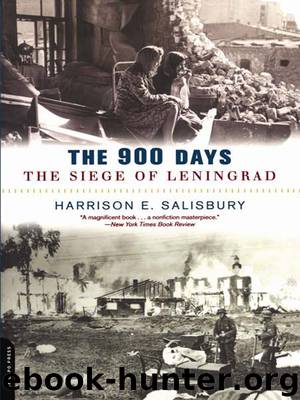The 900 Days by Harrison Salisbury

Author:Harrison Salisbury [Harrison E. Salisbury]
Language: eng
Format: epub, mobi
Publisher: Da Capo Press
Published: 2011-12-31T16:00:00+00:00
In these conditions to talk of mounting a counteroffensive was impossible. The best Voroshilov had been able to do was to carry out local counterattacks.
Voroshilov’s presentation was accurate. It was supported by Zhdanov and Secretary Kuznetsov. But it was not accepted by Stalin.
No full account of what happened on the night of September 11-12 has been made public. But it is probable that the culminating point in the indictment of Voroshilov was his failure to admit the loss of Shlisselburg.
Some time on the twelfth—possibly in the early morning hours, as this was Stalin’s usual time for making important decisions—the Supreme Command in Moscow decided to send Marshal Zhukov into Leningrad.2
A day was spent by Zhukov in collecting a staff. One member was Army General Ivan I. Fedyuninsky, a first-class officer who had been on the western Ukrainian frontier commanding the 15th Rifle Corps when the war started. He had fought through the desperate summer campaigns in south and central Russia. He had just been called in by Marshal A. M. Vasilevsky, Deputy Chief of Staff, to take over the Thirty-second Army which was being formed for the reserve front. Hardly had he gotten to Vyazma to join the Thirty-second Army staff than he was summoned to Moscow. He flew back on September 12 and was instructed to be ready to go to Leningrad in the morning.
On the Li-2 transport which lifted off Moscow’s Vnukovo airport early on the morning of September 13 with three fighters to protect it from German attack en route to Leningrad there were four generals: Zhukov, the toughest troubleshooter in the Red Army, the man who had been Chief of Staff at the war’s outbreak, who had been thrown in at Yelnya on the Western Front when the going got rough and who was now facing the most difficult assignment in his career; General M. S. Khozin, a solid man of no special brilliance, who was to be Chief of Staff; General P. I. Kokorev; and Fedyuninsky.
Khozin knew Leningrad intimately. He had commanded the Leningrad Military District until the eve of the winter war with Finland, when he was transferred to the Ukraine. He not only knew Leningrad but was well acquainted with the Karelian isthmus. He was a bear of a man with a figure which one of his associates described as monumental. He moved slowly and spoke with great precision.
What Fedyuninsky was to do in Leningrad was not very clear—either to him or, apparently, to Zhukov.
“For the time being,” Zhukov said, “you’ll be my deputy. Then well see.”
The flight to Leningrad was uneventful. Fedyuninsky looked about with interest as their cars sped from the airport to Smolny. The city seemed lovely. The weather was still sunny and warm. It was as though summer did not wish to leave the northern capital. But war’s grip was easy to see. There were not many people in the great squares or avenues. Fedyuninsky noticed that the golden dome of St. Isaac’s had been camouflaged a dirty gray. Under the red and orange leaves of the trees in the parks there were firing points and AA guns.
Download
This site does not store any files on its server. We only index and link to content provided by other sites. Please contact the content providers to delete copyright contents if any and email us, we'll remove relevant links or contents immediately.
| Arms Control | Diplomacy |
| Security | Trades & Tariffs |
| Treaties | African |
| Asian | Australian & Oceanian |
| Canadian | Caribbean & Latin American |
| European | Middle Eastern |
| Russian & Former Soviet Union |
The Secret History by Donna Tartt(19083)
The Social Justice Warrior Handbook by Lisa De Pasquale(12190)
Thirteen Reasons Why by Jay Asher(8907)
This Is How You Lose Her by Junot Diaz(6885)
Weapons of Math Destruction by Cathy O'Neil(6279)
Zero to One by Peter Thiel(5798)
Beartown by Fredrik Backman(5751)
The Myth of the Strong Leader by Archie Brown(5507)
The Fire Next Time by James Baldwin(5441)
How Democracies Die by Steven Levitsky & Daniel Ziblatt(5218)
Promise Me, Dad by Joe Biden(5153)
Stone's Rules by Roger Stone(5087)
A Higher Loyalty: Truth, Lies, and Leadership by James Comey(4959)
100 Deadly Skills by Clint Emerson(4924)
Rise and Kill First by Ronen Bergman(4788)
Secrecy World by Jake Bernstein(4751)
The David Icke Guide to the Global Conspiracy (and how to end it) by David Icke(4717)
The Farm by Tom Rob Smith(4506)
The Doomsday Machine by Daniel Ellsberg(4489)
